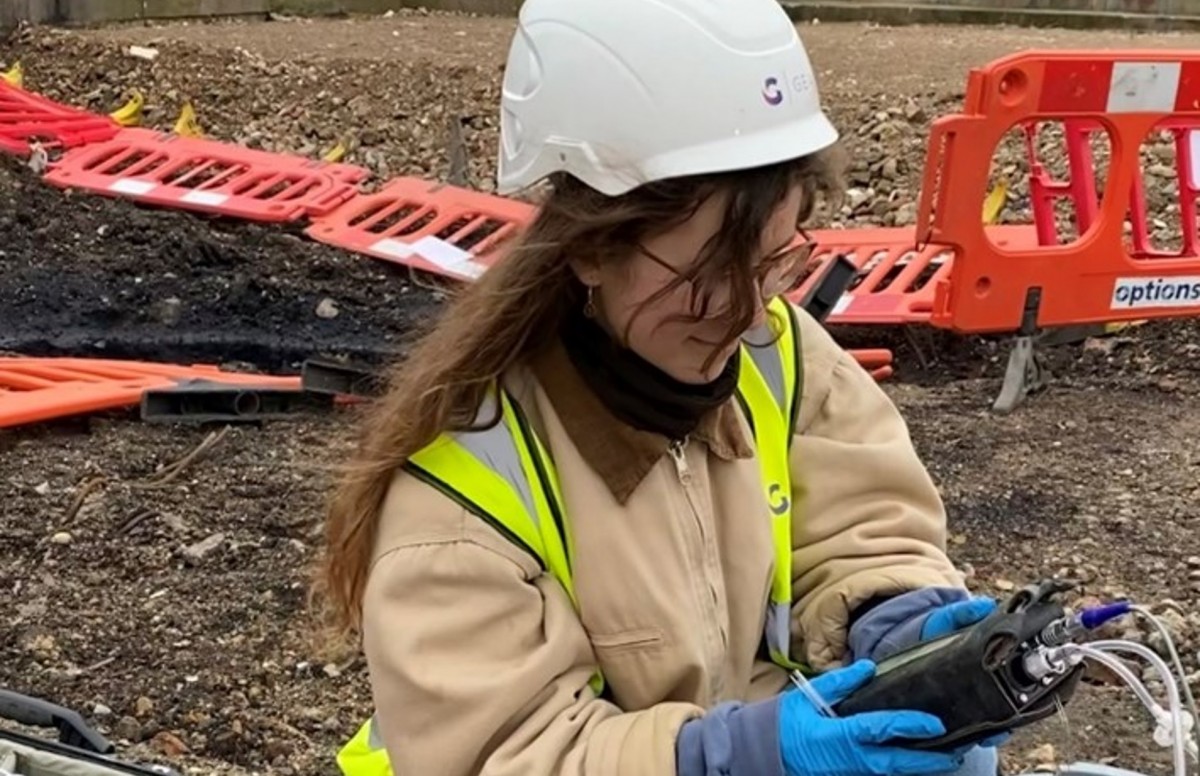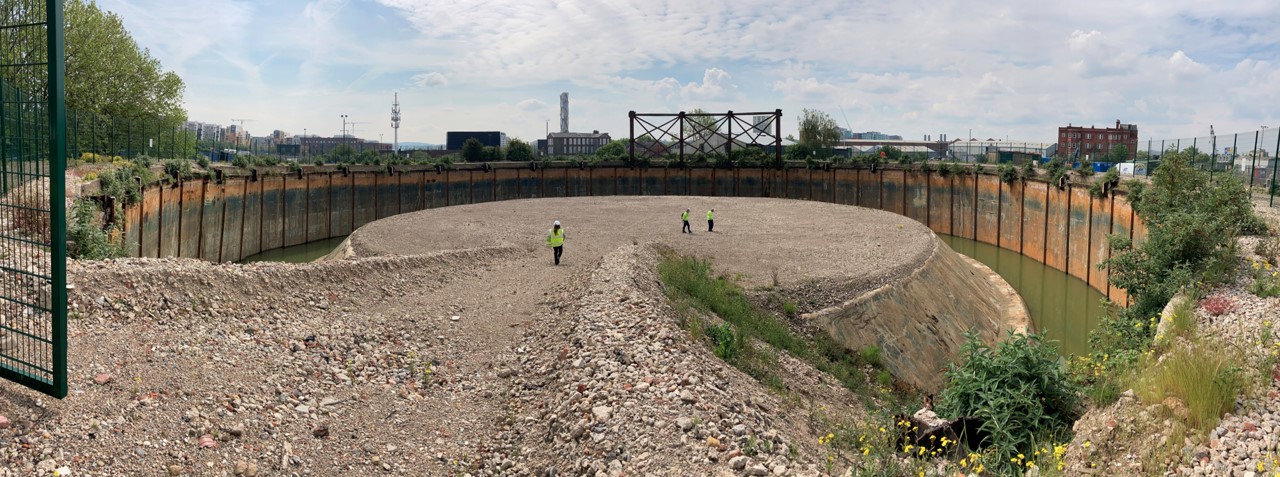
Whilst rarely visible to the general public, we are surrounded by amazing examples of geotechnical engineering, impacting the highways and rail networks we use on a daily basis to travel, to the foundations of the homes we live in. Playing a critical role in all kinds of infrastructure projects - by reducing risk to people and helping ensure construction project timelines and budgets are kept on track - a career in geotechnical engineering, and its associated fields, is varied and rewarding.
Having studied at the University of Portsmouth himself, Steve Branch – Geotechnical and Environmental Associates’ Managing Director – has a real enthusiasm for encouraging future generations of engineers, and has been welcoming Portsmouth students on placements at GEA for over 15 years. Julia Markowska, an undergraduate studying BEng (Hons) Engineering Geology and Geotechnics and currently on a one-year placement at GEA, shares what attracted her to this field of study and talks about her first six months working as an assistant engineer.
I was studying A Level Geology, Physics and Maths at Brockenhurst College and we had someone come in to the college to give a talk about engineering and geology. I just got completely hooked.
Yeah, definitely. It's quite a niche subject, so I feel like the people that do it are people that are genuinely interested in it.
I was really drawn by how it branches out across a range of other industries – ground investigation, geotechnical design, geoenvironmental, mining, renewable energy and more. I knew that starting my career within this field would provide me with lots of transferrable qualifications and experience, which will help me further explore the wider areas of this industry in the future.
The amount of experience I’ve gained in the past six months is invaluable. I've received lots of training, not only from the team within GEA but also external training that GEA has sponsored. I’ve also been able to observe different types of site work, as well as learn about report writing and how to deal directly with clients.
This placement is really allowing me to immerse myself in the industry, and understand how it all works. It’s extremely beneficial.
The best thing about this placement is the on-site shadowing opportunities, and I’m even getting the chance to carry out a little bit of my own site work. Some interesting jobs I’ve worked on include observing cable percussion drilling at a contaminated Victorian era gas works site in Greenwich, and personally monitoring groundwater and soil gas levels in a church courtyard at Piccadilly Circus.
The site in Greenwich was huge, and we were undertaking a range of ground investigation works. It was just really interesting to be there, to see the old gas structures and explore the contamination, and use that information to understand what they're going to do next with the site with regards to remediation. Plus, we were using cable percussion rigs to carry out deep boreholes, which is pretty cool to see.

As for conducting my own monitoring, a few months ago I went to a church courtyard in Piccadilly Circus - it was a really lovely site. I did a bit of ground monitoring, and took soil and gas measurements, as well as measuring the groundwater level. It's fairly simple stuff but it’s quite crucial for the work the engineers do here. And, it’s a great opportunity to get out on site on my own and figure out what I need to do whilst I’m there. It’s great experience.
Pretty much every site I go to is different. It could involve observing an experienced engineer on a really big, complex job, or going to someone’s back yard. And, whenever someone in the team has an interesting site involving work they don’t often get to do, they'll ask me if I want to come along to see it. It’s really varied – sites, ground conditions, results – and I love that variety. It keeps the placement really interesting and gives me lots of diverse experience.
Another highlight was working towards my CSCS card for accessing construction sites, and passing that with flying colours – I achieved 100% on the test! This is something I now have for the next 5 years, and demonstrates that I possess the required health and safety knowledge to work on large construction sites.
That I’m capable of a lot more than I thought! And that once you start working within the industry, you quickly realise it’s not as intimidating as it may have seemed when you’re at uni!
I chose this area of study because I really love geology, and there's definitely a lot of pure geology that we do at GEA. Looking at soils, logging and analysing soils - just generally looking at what’s in the ground. So it's definitely what I expected, plus a lot more!
With the engineering aspects, I’m getting to see and use different kinds of equipment - such as different rigs. And then there's geotechnical modelling, looking at how to design building foundations using the geological information that’s been collected, or designing slope stability models. I love seeing how geology is applied, as it’s one thing looking at and analysing rocks, but another thing using that information to inform construction projects, for example.
Eventually, in the future, I'm going to specialise. But for now, I'm not quite sure what that specialism will be. I just want to explore lots of different parts of the industry, gain as much experience as possible and see what opportunities exist. It’s really exciting.
The placement is giving me a mass of experience that future employers will be looking for, and it’s providing great insight into this industry – how it operates and where it could lead me. It’s shown me which direction I could take my career in.
The University of Portsmouth has a longstanding relationship with GEA, and it was a great help in arranging this placement for me. GEA specialises in many parts of the industry ranging from ground investigation and contaminated land remediation, to slope stability assessment. It’s a great place for someone looking to get experience in a variety of sectors within the industry.
Everyone here is really, really helpful too. So, whenever I need help, or I'm unsure about something, there's always somebody that I can talk to or someone to show me how something works. It’s really reassuring having that kind of support around me. As a small company, it's also really lovely knowing everyone I work with, and building relationships with my colleagues. It’s a really nice environment to work in.
I personally feel – especially at GEA – that it's just not really relevant anymore. There are loads of female engineers here and I’ve never felt that I’ve been treated differently, or singled out, for being female. Honestly, I don't even think about it. I’m just an engineer, full stop.
For more information about student placement opportunities at GEA, please get in touch.
Related News